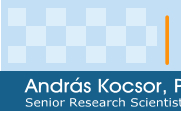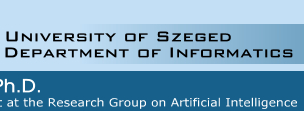Aggregation Operators and Hypothesis
Space Reductions in Speech Recognition
Gábor Gosztolya, András Kocsor
In this paper we deal with the heuristic exploration of general
hypothesis spaces arising both in the HMM and segment-based approaches
of speech recognition. The generated hypothesis space is a tree where
we assign costs to its nodes. The tree and the costs are both generated
in a top-down way where we have node extension rules and aggregation
operators for the cost calculation. We introduce a special set of
mean aggregation operators suitable for speech recognition tasks.
Then we discuss the efficiency of some heuristic search methods like
the Viterbi beam search, multi-stack decoding algorithm, and some
improvements using these aggregation operators. The tests showed that
this technique could significantly speed up the recognition process.
The run-times we obtained were 2 times faster than the basic multi-stack
decoding method, and 4 times faster than the Viterbi beam search method.





